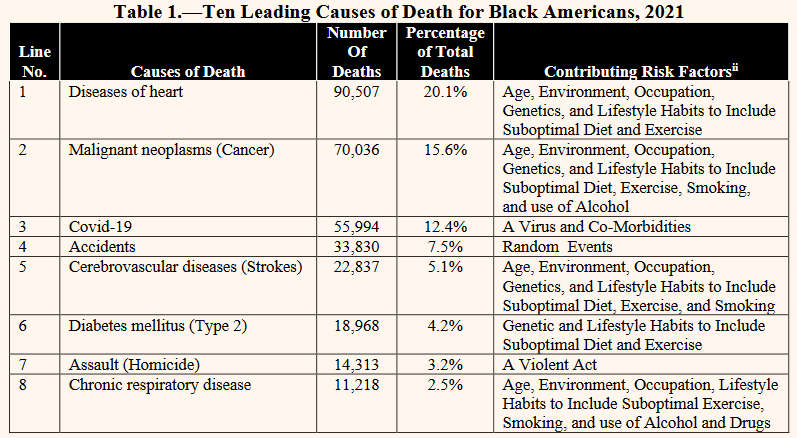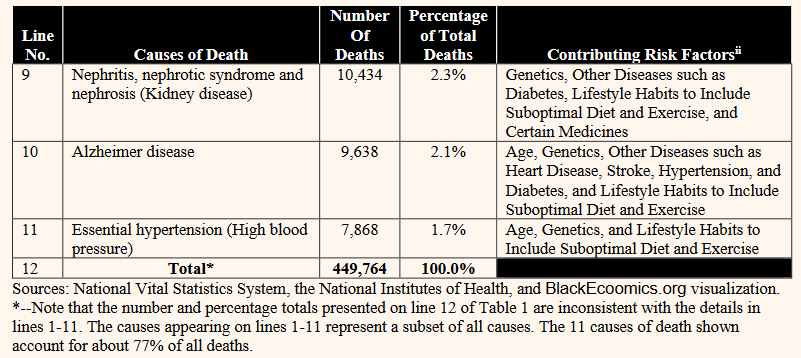By Dr. Brooks Robinson\Black Economics.org
Photos: YouTube Screenshots
Considerable interest and importance have long been assigned to nonfinancial and financial
wealth. However, there is the adage and realization that “Our health is our wealth.” Now we drill
down on the latter truth to assist Black Americans in realizing the higher health wellbeing. The
primary takeaway from this analysis brief is that, like nonfinancial and financial wealth, Black
Americans can engage in producing health wealth. We have considerable latitude, self-reliance,
self-determination, and liberty to produce health wealth. Therefore, we confront again the well-
known dictum: “Do for self.” Given that ill-health is a prevalent aspect of today’s Black American
condition, we should ask “Why”? Using the multiplicity of partial answers to the question, we
should commit to resolving current health concerns, and then to adopting the paradigm for good
health that is suggested in the Long-Term Strategic Plan for Black America (LTSPFBA):
“Prevent, Fortify, and Flourish.”[i]
The following are the top 10 causes of death for Black Americans for 2021 (the latest available
statistics).


Note that 11 (not 10) leading causes of death appear in Table 1 because the Covid-19 cause is
pandemic related, which was present during 2021, but would not typically appear as a leading
cause death for non-pandemic years.
In reviewing what are considered important contributing risk factors for each of the causes, it is
clear that, with the exception of Covid-19, Accidents, and Assault, the remaining eight leading
causes of death for Black Americans are linked to “lifestyle habits” to include suboptimal diet (i.e.,
the inefficacious consumption of food and beverages) and consumption of tobacco, alcohol, and
certain drugs. Also, suboptimal exercise is a contributing risk factor for most of the eight leading
causes of death. In other words, Black Americans have considerable opportunities to control risk
factors that combine to help cause the top ten killers. Proper attention to managing our lifestyle
habits; our diet; our tobacco, alcohol, and drug use; and engaging in sufficient exercise can help
reduce the likelihood that these eight diseases rise to become leading causes of death.
Given the prominent role of our lifestyles and consumption behavior in raising these diseases to
the level of “leading” causes of death, there are at least four noteworthy points. First, it is well
known (and significant efforts have been expended in certain locales to acknowledge and address
the problem) that Black Americans confront restricted opportunities to obtain access to high
quality diet sources. “Food desserts,” as they are known, invite an influx of unhealthy sources of
food for consumption into our areas of influence (communities), which exacerbate the role of diet
as a contributing risk factor in producing disease.
Second, local governments’ proclivity to license the sale of alcohol, tobacco, and now cannabis in
or near our areas of influence is another crucial factor that contributes to the elevation of
consumption-related risk factors that causes certain diseases to become leading cause of Black
American deaths.


Third, there is an integrated and supporting connection between the two foregoing points and the
role of health in local and national economies. We note often that health services-related output
constitutes nearly 20% of the nation’s total output (gross domestica product, GDP). Therefore, if this
large economic sector fails to grow, then growth for the entire economy is jeopardized. With
the latter point in mind, little effort is made to stifle the foregoing realities from contributing to the
process by which they increase death. We note that this is tantamount to saying explicitly that, like
one other service industry that is bad news for Black Americans (criminal justice services), the
health services industry exploits wantonly Black American minds, bodies, and souls as material
factor inputs in the nation’s economic production.[iii]
Fourth, the “virtuous circle” and integrated nature of the economy includes a pattern of
unannounced, but supportive processes that contribute mightily to Black America’s ill health.
Specifically, the nation’s governments contribute significantly to the following types of production
using taxpayer resources in ways that are not beneficial to certain taxpayers—especially Black
American taxpayers: (1) Agricultural and manufacturing production of unhealthy foods and
beverages; (2) pharmaceutical products that serve as treatment for ill-health that is caused by the
consumption of unhealthy foods; (3) wholesale and retail sales of the production just referenced
in items 1 and 2; (4) the creation and expansion of health related programs that require and enable
production by many other industries (construction, manufacturing, and numerous service
industries) in a quest to create an ever expanding healthcare sector with more and more employees
that build on the production highlighted in items 1, 2, and 3; and (5) media enterprises that play a
major role using the power of suggestion to cause consumers to: (i) Over consume goods and
services that are not in their best interest; and (ii) generate real or psychosomatic illnesses that
necessitate the need for health services and consumption of more harmful pharmaceutical products
than would otherwise be consumed.
Consequently, this analysis brief clarifies that Black Americans confront a choice. We can
continue to accept the status quo, or we can research, identify, and adopt alternative methods for
producing our health wealth using the newly suggested LTSPFBA paradigm: “Prevent, fortify,
and flourish.” If we choose the latter, then it serves as another step toward greater independence,
self-reliance, self-determination, and liberty. We can discontinue supporting economically and
enriching those who seek to use and destroy us. Most importantly, our production of health wealth
can be accompanied by nonfinancial and financial wealth secured by saving on healthcare, and we
can enjoy longer lives with considerably improved wellbeing.


Dr. Brooks Robinson is the founder of the Black Economics.org website.






